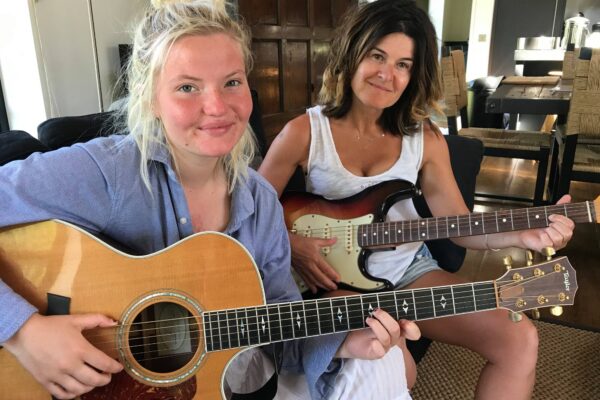
Mastering Lead Guitar
Mastering Lead Guitar: Going Beyond Pentatonic Scales for Expressive Playing
Are you ready to start Mastering Lead Guitar and rapidly improve your guitar playing to the next level? Many guitarists begin their improvisational journey by mastering the pentatonic scales, but once you feel comfortable with these five-note scales, it’s time to broaden your musical horizons. The next logical step is exploring the full major and minor scales, which offer a richer set of notes, unlocking new creative possibilities for melody and expression.
In this comprehensive guide, we will explore the importance of moving beyond the pentatonic scales and dive into practical techniques that can deepen your musical understanding and creativity.
Why Move Beyond Pentatonic Scales?
The pentatonic scales are a fantastic starting point for beginners because they are easy to learn and avoid the notes that typically clash with standard chord progressions. However, the five-note structure can become limiting as you develop as a guitarist. Let’s explore why moving beyond pentatonics can greatly enhance your playing:
- Unlock New Sounds: The full major and minor scales contain all seven notes in a key, giving you more melodic choices. This added variety allows for richer, more complex melodies and harmonies, enabling you to craft solos that are both intricate and expressive.
- Gain a Deeper Understanding of Music Theory: Learning the full major and minor scales will give you insight into how music works. You’ll develop a stronger sense of key signatures, chord progressions, and how melodies fit within the harmonic framework of a song. This deeper understanding opens the door to more sophisticated playing.
- Expanded Harmonic Awareness: Moving beyond pentatonic scales introduces you to modes, chord tones, and arpeggios, which can significantly improve your ability to navigate a broader range of musical styles and genres.
- Improved Soloing and Improvisation: While pentatonic scales provide a solid base for soloing, learning the full scales will expand your ability to create memorable, engaging solos. The extra notes allow for greater emotional range and creative expression, giving you more tools to work with in improvisational settings.
Understanding Major and Minor Scales: The Foundation of Music
To truly master the guitar, understanding the structure of major and minor scales is essential. These scales form the foundation of most Western music and are a gateway to exploring more advanced concepts like modes, arpeggios, and complex improvisation.
- Intervals and Structure: Major and minor scales are composed of seven notes, each with a specific intervallic relationship to the tonic (the root note of the scale). For example, the major scale follows a whole-whole-half-whole-whole-whole-half step pattern. The minor scale has a slightly different interval structure, producing a more melancholic sound. Understanding these intervals is crucial for building melodies, harmonies, and improvising effectively.
- The Role of Modes: Modes are variations of the major and minor scales and offer unique tonal flavors. For example:
- Ionian: The standard major scale.
- Dorian: A minor scale with a raised 6th, often used in jazz and rock.
- Phrygian: A darker mode with a lowered 2nd.
- Lydian: A major scale with a raised 4th, creating a dreamy quality.
- Mixolydian: A major scale with a lowered 7th, commonly used in blues and rock.
- Aeolian: The natural minor scale.
- Locrian: A diminished mode that works well in certain metal and jazz contexts.
Learning these modes will add color and variety to your playing, allowing you to play different genres and evoke different emotions with ease.
Incorporating Chord Tones and Arpeggios Into Your Playing
Moving beyond pentatonics also involves understanding the relationship between scales and the chords that underpin them. Incorporating chord tones and arpeggios into your playing can help you create solos that feel more connected to the harmony of a song.
- Arpeggios: Arpeggios are simply the notes of a chord played one at a time. Practicing arpeggios of the chords related to the scale you’re using will improve your ability to outline harmonic structures in your solos. This technique adds a level of sophistication to your playing, making your solos sound more intentional and melodic.
- Targeting Chord Tones: One key to creating strong solos is hitting chord tones on the downbeat of a measure. By doing this, your solo will feel more anchored in the harmony, making it sound more cohesive. For example, if you’re playing over a G major chord, targeting the G, B, or D notes during your solo will create a strong sense of resolution and connection to the underlying music.
Expanding Your Scale Repertoire: Beyond the Major and Minor
In addition to the major and minor scales, there are other scales that can add interesting textures and emotions to your playing. Here are a few essential ones:
- Blues Scale: A variation of the minor pentatonic scale, the blues scale adds a flat 5th, creating a “blue” note that gives this scale its characteristic sound. It’s a must-know for any guitarist interested in rock, jazz, or blues.
- Harmonic Minor Scale: The harmonic minor scale is widely used in classical and jazz music. It has a raised 7th note, creating a more exotic sound that’s perfect for adding tension and drama to your solos.
- Melodic Minor Scale: This scale is unique because it has different ascending and descending forms. The ascending melodic minor features a raised 6th and 7th, while the descending version reverts to the natural minor. It’s commonly used in jazz to create smooth, sophisticated melodies.
Ear Training and Interval Recognition: Elevating Your Musicianship
One of the most important aspects of becoming a great guitarist is developing a good ear. Being able to recognize intervals, chords, and melodies by ear will make you a more intuitive and responsive musician. Here are some tips for improving your ear:
- Interval Training: Practice identifying the distance between two notes. Start with simple intervals like perfect 4ths or 5ths and gradually move to more complex ones like minor 6ths or major 7ths. This skill will help you anticipate chord changes and melodies when playing with others.
- Transcription: Try learning solos, riffs, or entire songs by ear. Transcribing music from recordings will sharpen your ability to hear nuances in melodies, rhythms, and phrasing. This exercise is invaluable for developing a deeper connection to the music you play.
Practice Tips: Building Confidence, Creativity when Mastering Lead Guitar
Now that you understand the importance of moving beyond pentatonic scales, here are some practical tips to help you integrate these new ideas into your practice routine:
- Use a Metronome: Timing is everything. A metronome will help you stay in rhythm, ensuring that your improvisations and melodies flow smoothly.
- Jam with Others: Playing with other musicians is one of the best ways to apply what you’ve learned. Whether it’s a live jam session or an online backing track, regular practice in a real-world context will help solidify your skills.
- Experiment with Different Scales: Don’t limit yourself to the same scales. Explore modes, harmonic minor, and other exotic scales to find your own unique sound.
- Record Yourself: Recording your practice sessions allows you to listen back and analyze your playing. You’ll be able to identify areas for improvement and track your progress over time.
Mastering Lead Guitar Endless Possibilities with Full Scales
Moving beyond the pentatonic scales is a critical step in mastering the guitar. By incorporating the full major and minor scales, modes, chord tones, and arpeggios into your playing, you’ll be able to craft more expressive, sophisticated music. Keep practicing, keep experimenting, and soon you’ll unlock a whole new world of musical possibilities.
Whether you’re a beginner or an experienced guitarist, expanding your scale knowledge will significantly enhance your ability to improvise, compose, and understand music on a deeper level. Start today, and enjoy the creative freedom that comes with mastering the full spectrum of scales!
- pentatonic scale improvisation exercises, pentatonic soloing techniques, pentatonic improvisation for beginners, pentatonic improvisation tips and tricks, how to improvise with a pentatonic scale, pentatonic improvisation over blues,pentatonic improvisation over jazz standards







